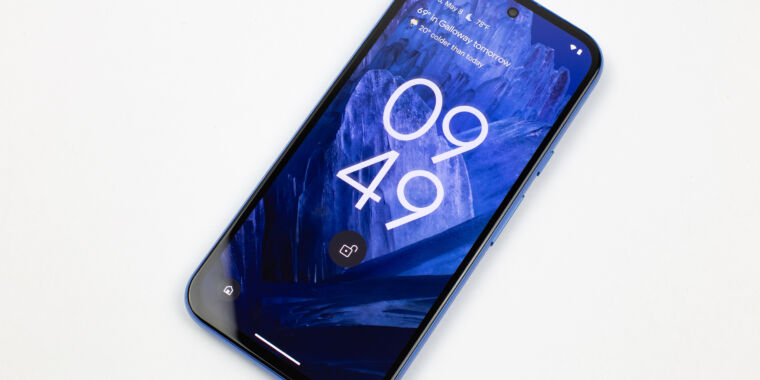-
The Pixel 8a and its speedy 120 Hz display.
Ron Amadeo -
The back is a micro-textured plastic—and it’s very blue.
Ron Amadeo -
The aluminum camera bar houses the same cameras as last year.
Ron Amadeo -
The camera bar just barely sticks out from the back.
Ron Amadeo -
The bottom has a USB-C port.
Ron Amadeo -
The usual power and volume buttons on this side.
Ron Amadeo -
Compared to the Pixel 7a (right), you get rounded corners and brighter colors.
Ron Amadeo -
The home screen.
Ron Amadeo
| SPECS AT A GLANCE: Pixel 8a | |
|---|---|
| SCREEN | 6.1-inch, 120 Hz, 2400×1080 OLED |
| OS | Android 14 |
| CPU | Google Tensor G3
One 3.0 GHz Cortex-X3 core |
| GPU | ARM Mali-G715 |
| RAM | 8GB |
| STORAGE | 128GB, UFS 3.1 |
| BATTERY | 4492 mAh |
| NETWORKING | Wi-Fi 6E, Bluetooth 5.3, GPS, NFC |
| PORTS | USB Type-C 3.1 Gen 1 with 18 W USB-PD 3.0 charging |
| CAMERA | 64MP main camera, 13 MP Ultrawide, 13 MP front camera |
| SIZE | 152.1×72.7×8.9 mm |
| WEIGHT | 188 g |
| STARTING PRICE | $499.99 |
| OTHER PERKS | IP67 dust and water resistance, eSIM, in-screen fingerprint reader, 5 W wireless charging |
Somehow, Google’s midrange phone just keeps getting better. The Pixel 8a improves on many things over the Pixel 7a—it has a better display, a longer support cycle, and the usual yearly CPU upgrades, all at the same $499 price as last year. Who could complain? The Pixel A series was already the best bargain in smartphones, and there’s now very little difference between it and a flagship-class device.
Year over year, the 6.1-inch, 2400×1080 display is being upgraded from 90 Hz to 120 Hz, giving you essentially the same experience you’d get on the “flagship” Pixels. The SoC is the same processor you’d get in the Pixel 9, a Google Tensor G3. That’s a 4 nm chip with one Arm Cortex X3, four Cortex A715 cores, four Cortex A510 cores, and a Mali G715 GPU.
Previously, the 120 Hz display was the primary thing A-series owners were missing out on compared to the more expensive Pixels, so its addition is a huge deal. Any comparison between the “midrange” Pixel 8a and the “flagship” 6.2-inch Pixel 8 will now just be splitting hairs. The flagship gets an extra 0.1 inches of display, 2 percent more battery, and Wi-Fi 6E instead of Wi-Fi 7. The cameras are technically newer, but since they all run the same image-stacking software, the images look very similar. Are those things worth an extra $200? No, they are not.
It looks like the Pixel 9 will end up with a third model, a small “Pro” model with three cameras, presumably to try to put some distance between the flagship Pixels and the A series. The company will still ship a base-model Pixel 9 that will probably be consumed by the Pixel 9a, but if they cut that model, that could arrive at a cohesive lineup.
Ron Amadeo
The other big upgrade is seven years of update support. Just like on the Pixel 8, you’ll now get monthly security updates and major Android OS updates for a whopping seven years, the longest promise in the industry. Whether a phone like this can actually run what would presumably be “Android 21” in 2031 is anyone’s guess. Previous Pixel models have often felt like they were being prematurely killed due to the short three-year update window.
When planning this far ahead, you most likely do have to pick one situation or the other as hardware ages: Do you want the phone to die a premature death due to software limits or have a years-longer life cycle with an eventual software update that runs poorly because the hardware is too slow? Even if running Android 21 is a challenge for this little midranger, the phone will at least be allowed to die a natural death due to actual hardware limitations. Google won’t be creating e-waste due to an artificial software timeline; the phone will actually be e-waste, and now users will be allowed to squeeze as much life as possible out of it. That’s a good thing!
Over those seven years, don’t be surprised if the Pixel 8a misses out on some of Google’s future AI features. The phone has 8GB of RAM, and Google is already saying that’s not enough for some of the AI features it wants to make in the future. The company says something like a generative AI-powered smart reply system would require keeping models in memory 24/7, and that would cut down on memory available for the OS, so phones need more memory. One leaked Pixel 9 model had 16GB of RAM, which is wild.
I’m someone who views a phone as a piece of hardware for running apps and just wants the OS to be simple and clean and get out of the way. I don’t need any of Google’s generative AI features, so I don’t consider this a big loss at all. Hopefully, future builds of Android allow you to turn AI features off. If Google actually wants to support these 8GB of RAM devices for seven years, it will need to do that.

